An Analysis of the Sociological Context in UK Health and Social Care
VerifiedAdded on 2020/01/21
|12
|3788
|47
Report
AI Summary
This report provides a comprehensive analysis of the sociological context of health and social care within the United Kingdom. It begins by defining sociology and its relevance to the field, focusing on social stratification, political, social, and economic constructs, and cultural values. The report investigates current societal trends, such as technological advancements and demographic shifts, and their impact on social expectations and individual well-being. It then explores social inequalities in health and social care, including those based on social class, ethnicity, and age, and examines their implications for individuals' health status and life chances. The report also examines the impact of social change on the health and social care sector. The study concludes by summarizing key findings and suggesting meaningful measures to address the identified challenges. The report uses examples of patient demographics in UK health and social care firms to support its arguments.
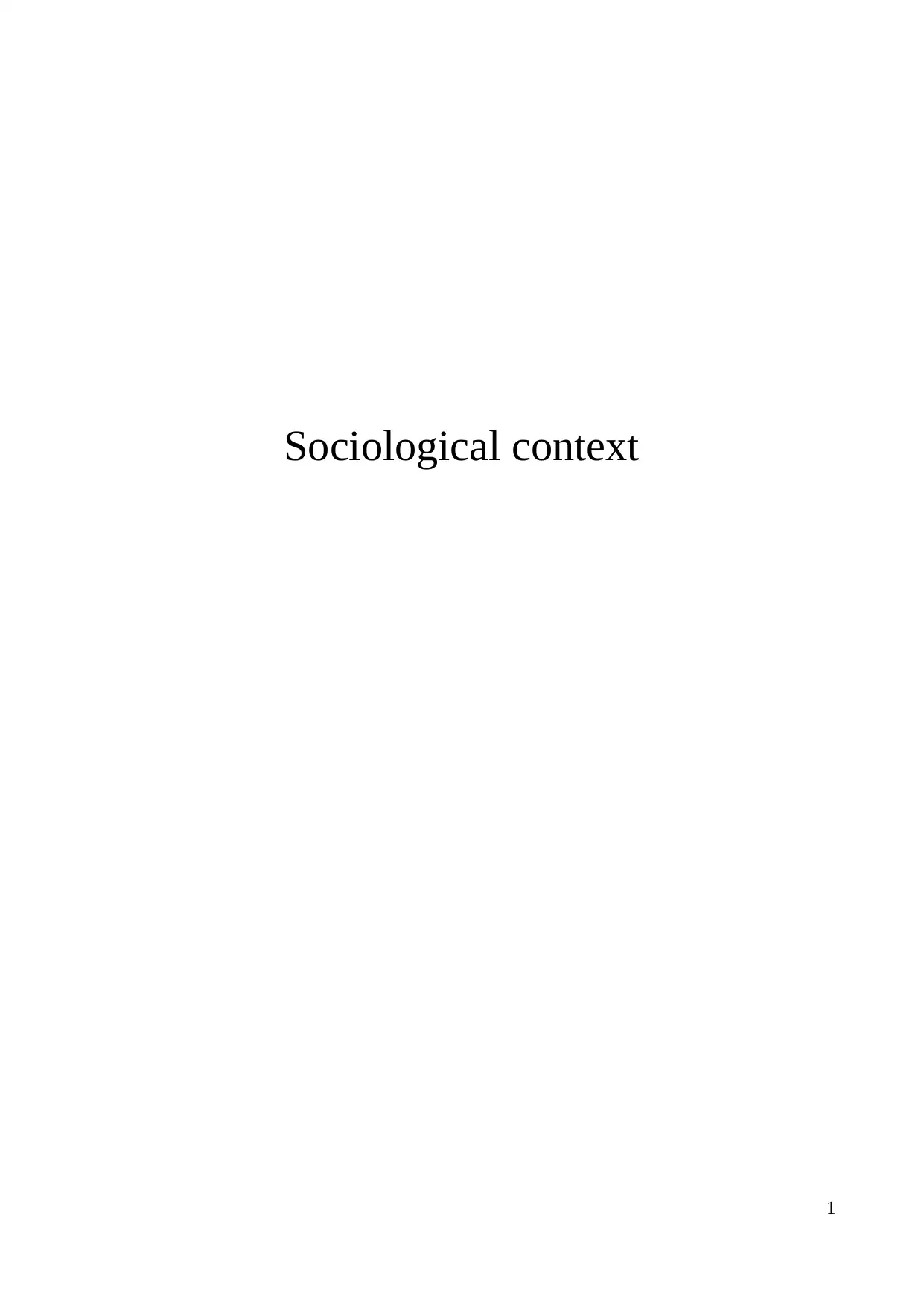
Sociological context
1
1
Paraphrase This Document
Need a fresh take? Get an instant paraphrase of this document with our AI Paraphraser
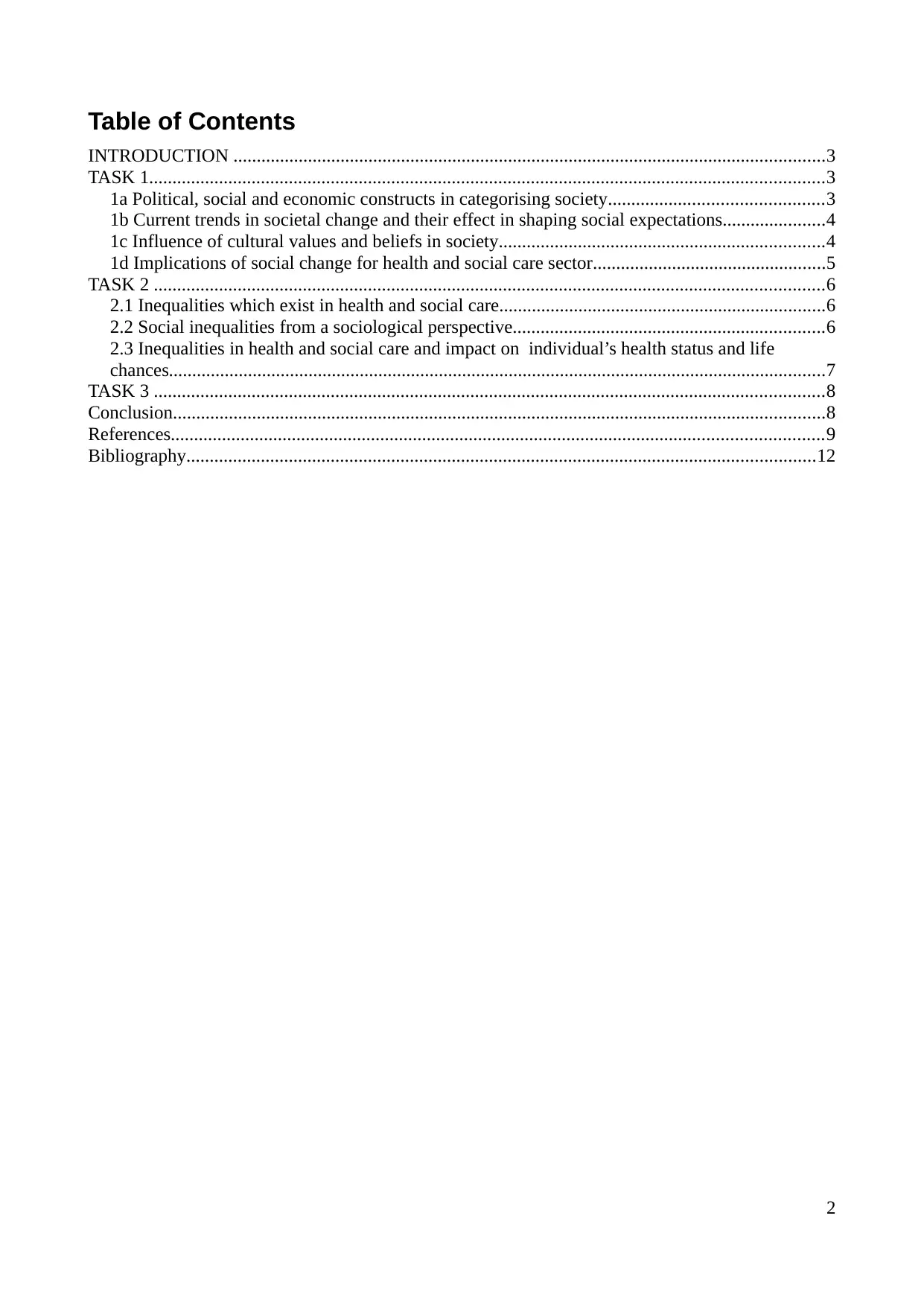
Table of Contents
INTRODUCTION ...............................................................................................................................3
TASK 1.................................................................................................................................................3
1a Political, social and economic constructs in categorising society..............................................3
1b Current trends in societal change and their effect in shaping social expectations......................4
1c Influence of cultural values and beliefs in society......................................................................4
1d Implications of social change for health and social care sector..................................................5
TASK 2 ................................................................................................................................................6
2.1 Inequalities which exist in health and social care......................................................................6
2.2 Social inequalities from a sociological perspective...................................................................6
2.3 Inequalities in health and social care and impact on individual’s health status and life
chances.............................................................................................................................................7
TASK 3 ................................................................................................................................................8
Conclusion............................................................................................................................................8
References............................................................................................................................................9
Bibliography.......................................................................................................................................12
2
INTRODUCTION ...............................................................................................................................3
TASK 1.................................................................................................................................................3
1a Political, social and economic constructs in categorising society..............................................3
1b Current trends in societal change and their effect in shaping social expectations......................4
1c Influence of cultural values and beliefs in society......................................................................4
1d Implications of social change for health and social care sector..................................................5
TASK 2 ................................................................................................................................................6
2.1 Inequalities which exist in health and social care......................................................................6
2.2 Social inequalities from a sociological perspective...................................................................6
2.3 Inequalities in health and social care and impact on individual’s health status and life
chances.............................................................................................................................................7
TASK 3 ................................................................................................................................................8
Conclusion............................................................................................................................................8
References............................................................................................................................................9
Bibliography.......................................................................................................................................12
2
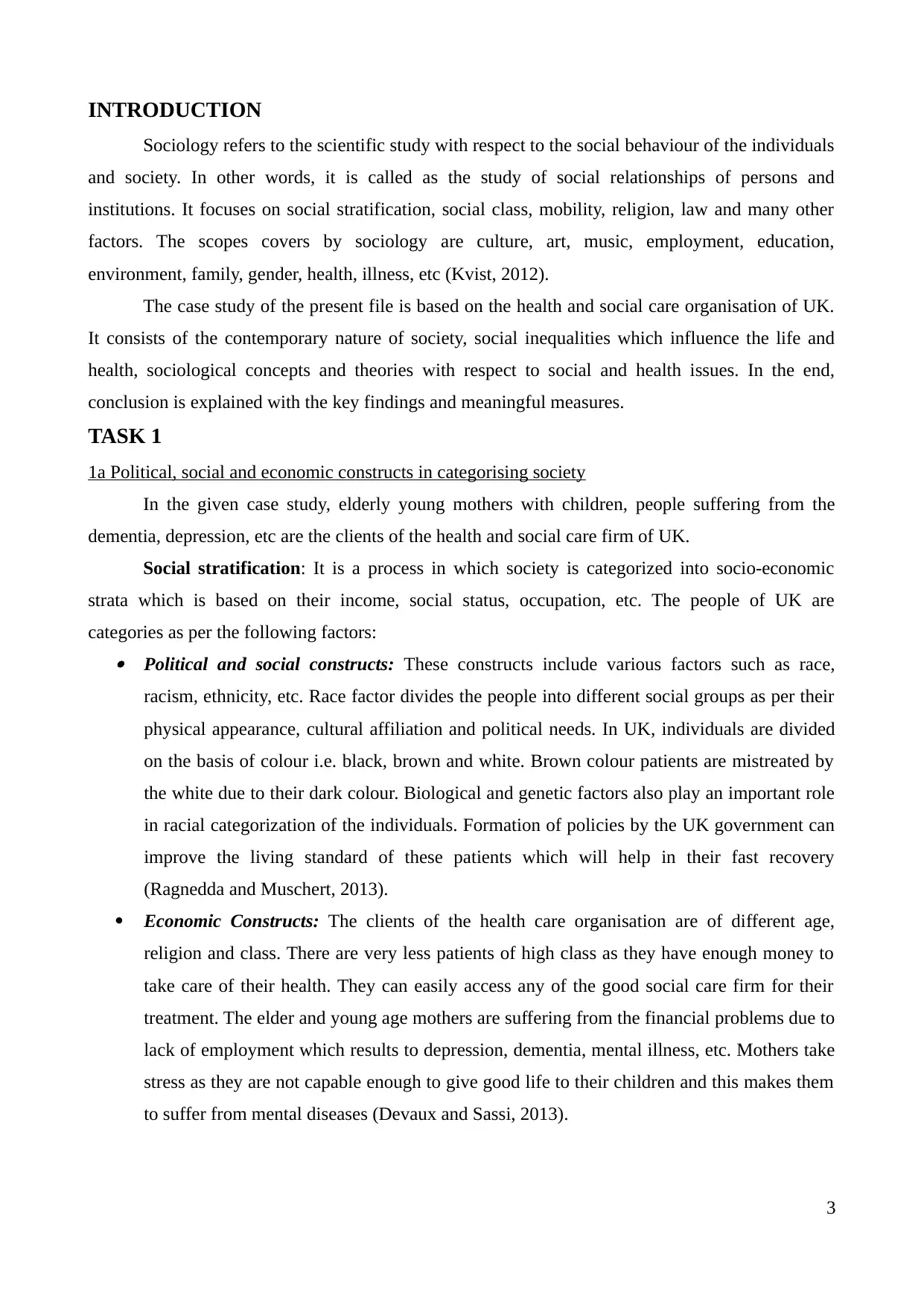
INTRODUCTION
Sociology refers to the scientific study with respect to the social behaviour of the individuals
and society. In other words, it is called as the study of social relationships of persons and
institutions. It focuses on social stratification, social class, mobility, religion, law and many other
factors. The scopes covers by sociology are culture, art, music, employment, education,
environment, family, gender, health, illness, etc (Kvist, 2012).
The case study of the present file is based on the health and social care organisation of UK.
It consists of the contemporary nature of society, social inequalities which influence the life and
health, sociological concepts and theories with respect to social and health issues. In the end,
conclusion is explained with the key findings and meaningful measures.
TASK 1
1a Political, social and economic constructs in categorising society
In the given case study, elderly young mothers with children, people suffering from the
dementia, depression, etc are the clients of the health and social care firm of UK.
Social stratification: It is a process in which society is categorized into socio-economic
strata which is based on their income, social status, occupation, etc. The people of UK are
categories as per the following factors: Political and social constructs: These constructs include various factors such as race,
racism, ethnicity, etc. Race factor divides the people into different social groups as per their
physical appearance, cultural affiliation and political needs. In UK, individuals are divided
on the basis of colour i.e. black, brown and white. Brown colour patients are mistreated by
the white due to their dark colour. Biological and genetic factors also play an important role
in racial categorization of the individuals. Formation of policies by the UK government can
improve the living standard of these patients which will help in their fast recovery
(Ragnedda and Muschert, 2013).
Economic Constructs: The clients of the health care organisation are of different age,
religion and class. There are very less patients of high class as they have enough money to
take care of their health. They can easily access any of the good social care firm for their
treatment. The elder and young age mothers are suffering from the financial problems due to
lack of employment which results to depression, dementia, mental illness, etc. Mothers take
stress as they are not capable enough to give good life to their children and this makes them
to suffer from mental diseases (Devaux and Sassi, 2013).
3
Sociology refers to the scientific study with respect to the social behaviour of the individuals
and society. In other words, it is called as the study of social relationships of persons and
institutions. It focuses on social stratification, social class, mobility, religion, law and many other
factors. The scopes covers by sociology are culture, art, music, employment, education,
environment, family, gender, health, illness, etc (Kvist, 2012).
The case study of the present file is based on the health and social care organisation of UK.
It consists of the contemporary nature of society, social inequalities which influence the life and
health, sociological concepts and theories with respect to social and health issues. In the end,
conclusion is explained with the key findings and meaningful measures.
TASK 1
1a Political, social and economic constructs in categorising society
In the given case study, elderly young mothers with children, people suffering from the
dementia, depression, etc are the clients of the health and social care firm of UK.
Social stratification: It is a process in which society is categorized into socio-economic
strata which is based on their income, social status, occupation, etc. The people of UK are
categories as per the following factors: Political and social constructs: These constructs include various factors such as race,
racism, ethnicity, etc. Race factor divides the people into different social groups as per their
physical appearance, cultural affiliation and political needs. In UK, individuals are divided
on the basis of colour i.e. black, brown and white. Brown colour patients are mistreated by
the white due to their dark colour. Biological and genetic factors also play an important role
in racial categorization of the individuals. Formation of policies by the UK government can
improve the living standard of these patients which will help in their fast recovery
(Ragnedda and Muschert, 2013).
Economic Constructs: The clients of the health care organisation are of different age,
religion and class. There are very less patients of high class as they have enough money to
take care of their health. They can easily access any of the good social care firm for their
treatment. The elder and young age mothers are suffering from the financial problems due to
lack of employment which results to depression, dementia, mental illness, etc. Mothers take
stress as they are not capable enough to give good life to their children and this makes them
to suffer from mental diseases (Devaux and Sassi, 2013).
3
⊘ This is a preview!⊘
Do you want full access?
Subscribe today to unlock all pages.

Trusted by 1+ million students worldwide
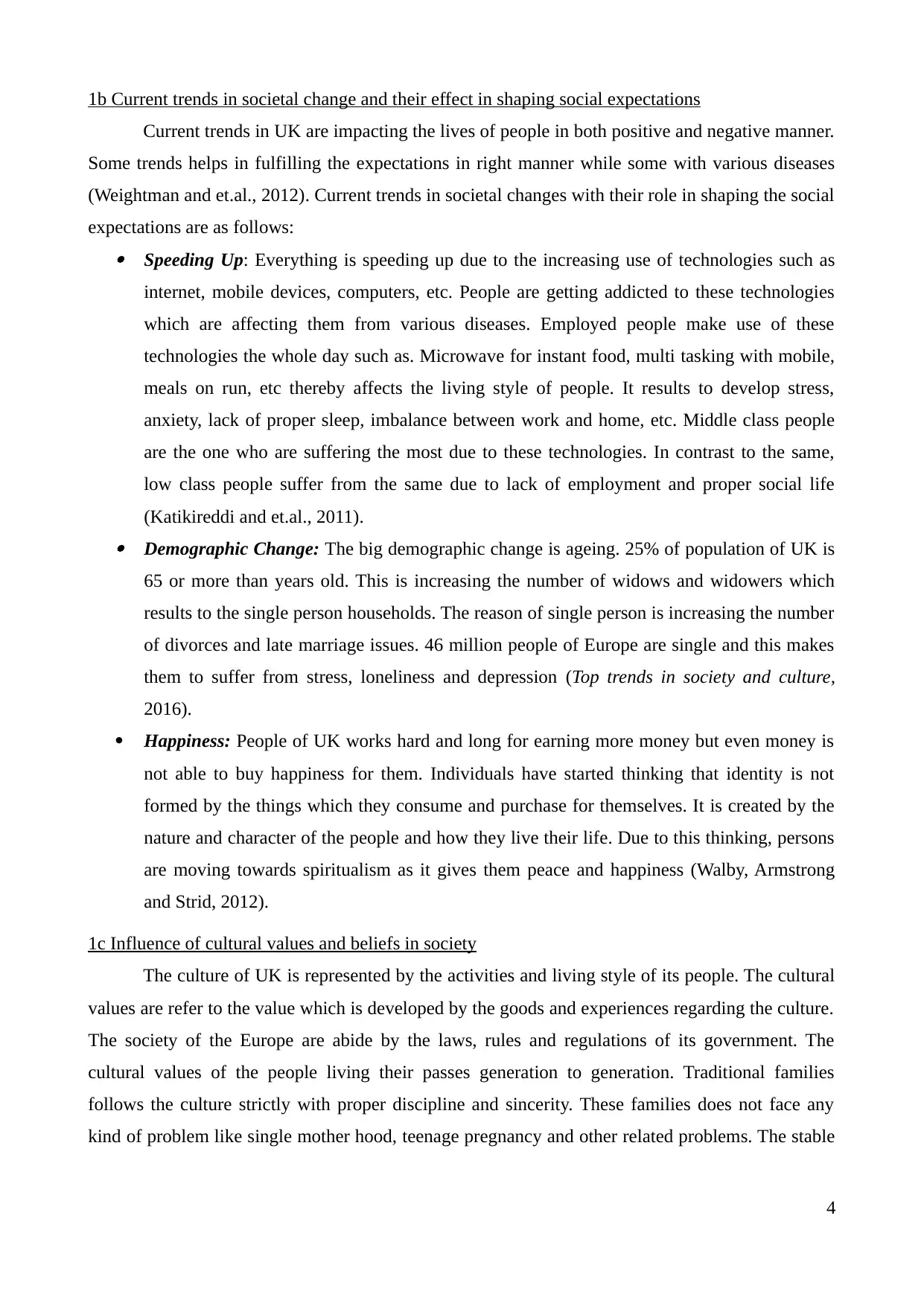
1b Current trends in societal change and their effect in shaping social expectations
Current trends in UK are impacting the lives of people in both positive and negative manner.
Some trends helps in fulfilling the expectations in right manner while some with various diseases
(Weightman and et.al., 2012). Current trends in societal changes with their role in shaping the social
expectations are as follows: Speeding Up: Everything is speeding up due to the increasing use of technologies such as
internet, mobile devices, computers, etc. People are getting addicted to these technologies
which are affecting them from various diseases. Employed people make use of these
technologies the whole day such as. Microwave for instant food, multi tasking with mobile,
meals on run, etc thereby affects the living style of people. It results to develop stress,
anxiety, lack of proper sleep, imbalance between work and home, etc. Middle class people
are the one who are suffering the most due to these technologies. In contrast to the same,
low class people suffer from the same due to lack of employment and proper social life
(Katikireddi and et.al., 2011). Demographic Change: The big demographic change is ageing. 25% of population of UK is
65 or more than years old. This is increasing the number of widows and widowers which
results to the single person households. The reason of single person is increasing the number
of divorces and late marriage issues. 46 million people of Europe are single and this makes
them to suffer from stress, loneliness and depression (Top trends in society and culture,
2016).
Happiness: People of UK works hard and long for earning more money but even money is
not able to buy happiness for them. Individuals have started thinking that identity is not
formed by the things which they consume and purchase for themselves. It is created by the
nature and character of the people and how they live their life. Due to this thinking, persons
are moving towards spiritualism as it gives them peace and happiness (Walby, Armstrong
and Strid, 2012).
1c Influence of cultural values and beliefs in society
The culture of UK is represented by the activities and living style of its people. The cultural
values are refer to the value which is developed by the goods and experiences regarding the culture.
The society of the Europe are abide by the laws, rules and regulations of its government. The
cultural values of the people living their passes generation to generation. Traditional families
follows the culture strictly with proper discipline and sincerity. These families does not face any
kind of problem like single mother hood, teenage pregnancy and other related problems. The stable
4
Current trends in UK are impacting the lives of people in both positive and negative manner.
Some trends helps in fulfilling the expectations in right manner while some with various diseases
(Weightman and et.al., 2012). Current trends in societal changes with their role in shaping the social
expectations are as follows: Speeding Up: Everything is speeding up due to the increasing use of technologies such as
internet, mobile devices, computers, etc. People are getting addicted to these technologies
which are affecting them from various diseases. Employed people make use of these
technologies the whole day such as. Microwave for instant food, multi tasking with mobile,
meals on run, etc thereby affects the living style of people. It results to develop stress,
anxiety, lack of proper sleep, imbalance between work and home, etc. Middle class people
are the one who are suffering the most due to these technologies. In contrast to the same,
low class people suffer from the same due to lack of employment and proper social life
(Katikireddi and et.al., 2011). Demographic Change: The big demographic change is ageing. 25% of population of UK is
65 or more than years old. This is increasing the number of widows and widowers which
results to the single person households. The reason of single person is increasing the number
of divorces and late marriage issues. 46 million people of Europe are single and this makes
them to suffer from stress, loneliness and depression (Top trends in society and culture,
2016).
Happiness: People of UK works hard and long for earning more money but even money is
not able to buy happiness for them. Individuals have started thinking that identity is not
formed by the things which they consume and purchase for themselves. It is created by the
nature and character of the people and how they live their life. Due to this thinking, persons
are moving towards spiritualism as it gives them peace and happiness (Walby, Armstrong
and Strid, 2012).
1c Influence of cultural values and beliefs in society
The culture of UK is represented by the activities and living style of its people. The cultural
values are refer to the value which is developed by the goods and experiences regarding the culture.
The society of the Europe are abide by the laws, rules and regulations of its government. The
cultural values of the people living their passes generation to generation. Traditional families
follows the culture strictly with proper discipline and sincerity. These families does not face any
kind of problem like single mother hood, teenage pregnancy and other related problems. The stable
4
Paraphrase This Document
Need a fresh take? Get an instant paraphrase of this document with our AI Paraphraser
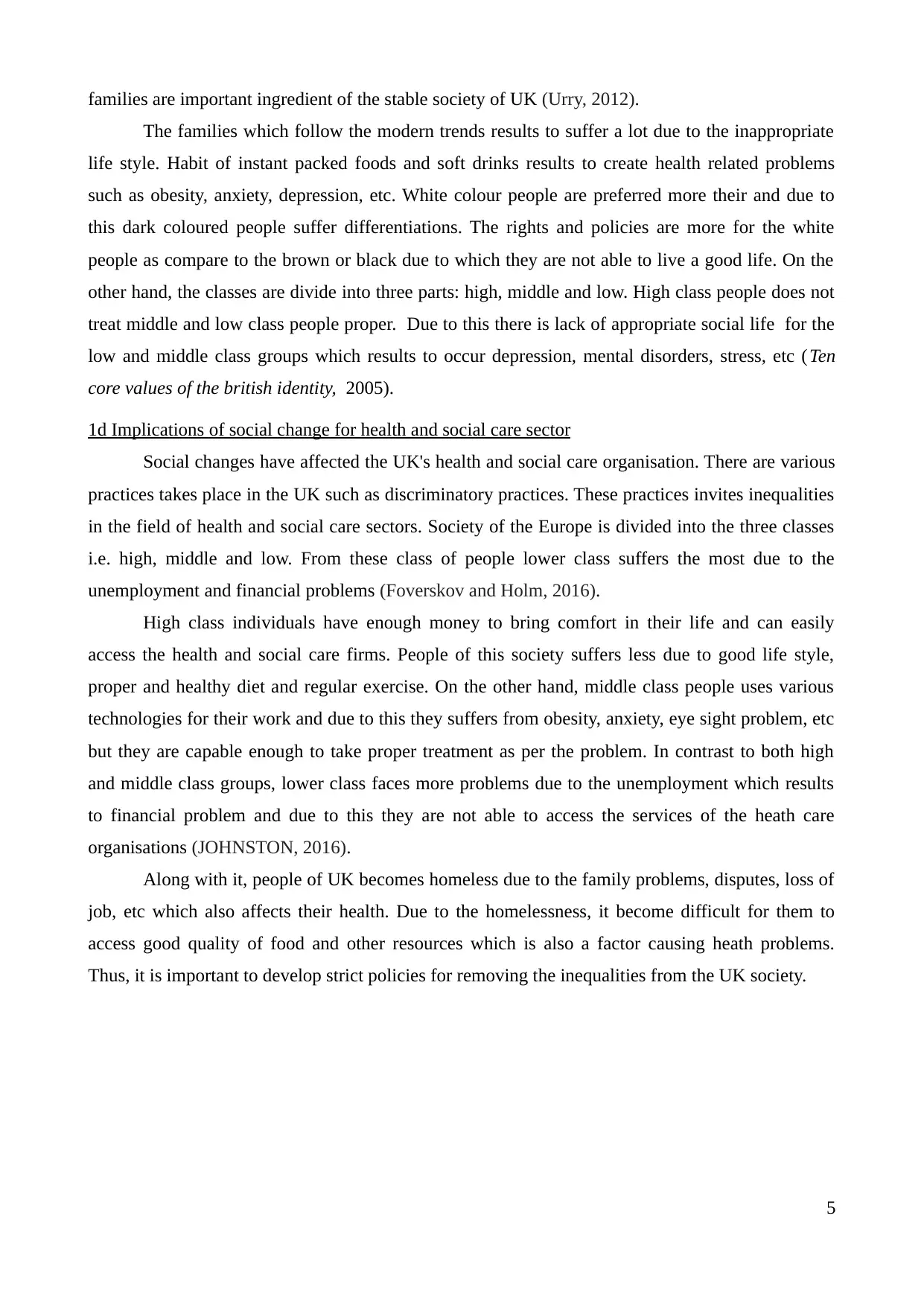
families are important ingredient of the stable society of UK (Urry, 2012).
The families which follow the modern trends results to suffer a lot due to the inappropriate
life style. Habit of instant packed foods and soft drinks results to create health related problems
such as obesity, anxiety, depression, etc. White colour people are preferred more their and due to
this dark coloured people suffer differentiations. The rights and policies are more for the white
people as compare to the brown or black due to which they are not able to live a good life. On the
other hand, the classes are divide into three parts: high, middle and low. High class people does not
treat middle and low class people proper. Due to this there is lack of appropriate social life for the
low and middle class groups which results to occur depression, mental disorders, stress, etc (Ten
core values of the british identity, 2005).
1d Implications of social change for health and social care sector
Social changes have affected the UK's health and social care organisation. There are various
practices takes place in the UK such as discriminatory practices. These practices invites inequalities
in the field of health and social care sectors. Society of the Europe is divided into the three classes
i.e. high, middle and low. From these class of people lower class suffers the most due to the
unemployment and financial problems (Foverskov and Holm, 2016).
High class individuals have enough money to bring comfort in their life and can easily
access the health and social care firms. People of this society suffers less due to good life style,
proper and healthy diet and regular exercise. On the other hand, middle class people uses various
technologies for their work and due to this they suffers from obesity, anxiety, eye sight problem, etc
but they are capable enough to take proper treatment as per the problem. In contrast to both high
and middle class groups, lower class faces more problems due to the unemployment which results
to financial problem and due to this they are not able to access the services of the heath care
organisations (JOHNSTON, 2016).
Along with it, people of UK becomes homeless due to the family problems, disputes, loss of
job, etc which also affects their health. Due to the homelessness, it become difficult for them to
access good quality of food and other resources which is also a factor causing heath problems.
Thus, it is important to develop strict policies for removing the inequalities from the UK society.
5
The families which follow the modern trends results to suffer a lot due to the inappropriate
life style. Habit of instant packed foods and soft drinks results to create health related problems
such as obesity, anxiety, depression, etc. White colour people are preferred more their and due to
this dark coloured people suffer differentiations. The rights and policies are more for the white
people as compare to the brown or black due to which they are not able to live a good life. On the
other hand, the classes are divide into three parts: high, middle and low. High class people does not
treat middle and low class people proper. Due to this there is lack of appropriate social life for the
low and middle class groups which results to occur depression, mental disorders, stress, etc (Ten
core values of the british identity, 2005).
1d Implications of social change for health and social care sector
Social changes have affected the UK's health and social care organisation. There are various
practices takes place in the UK such as discriminatory practices. These practices invites inequalities
in the field of health and social care sectors. Society of the Europe is divided into the three classes
i.e. high, middle and low. From these class of people lower class suffers the most due to the
unemployment and financial problems (Foverskov and Holm, 2016).
High class individuals have enough money to bring comfort in their life and can easily
access the health and social care firms. People of this society suffers less due to good life style,
proper and healthy diet and regular exercise. On the other hand, middle class people uses various
technologies for their work and due to this they suffers from obesity, anxiety, eye sight problem, etc
but they are capable enough to take proper treatment as per the problem. In contrast to both high
and middle class groups, lower class faces more problems due to the unemployment which results
to financial problem and due to this they are not able to access the services of the heath care
organisations (JOHNSTON, 2016).
Along with it, people of UK becomes homeless due to the family problems, disputes, loss of
job, etc which also affects their health. Due to the homelessness, it become difficult for them to
access good quality of food and other resources which is also a factor causing heath problems.
Thus, it is important to develop strict policies for removing the inequalities from the UK society.
5
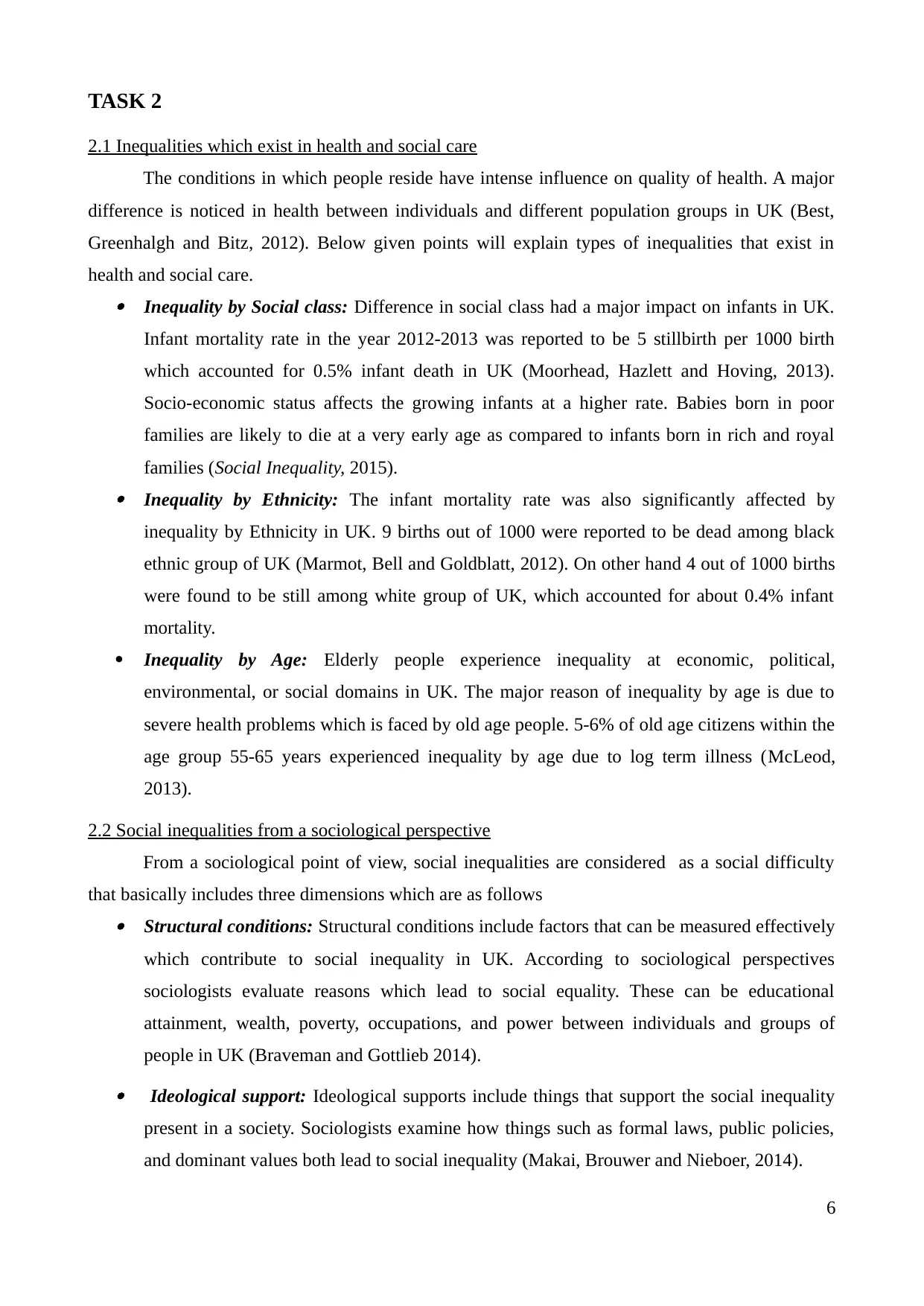
TASK 2
2.1 Inequalities which exist in health and social care
The conditions in which people reside have intense influence on quality of health. A major
difference is noticed in health between individuals and different population groups in UK (Best,
Greenhalgh and Bitz, 2012). Below given points will explain types of inequalities that exist in
health and social care. Inequality by Social class: Difference in social class had a major impact on infants in UK.
Infant mortality rate in the year 2012-2013 was reported to be 5 stillbirth per 1000 birth
which accounted for 0.5% infant death in UK (Moorhead, Hazlett and Hoving, 2013).
Socio-economic status affects the growing infants at a higher rate. Babies born in poor
families are likely to die at a very early age as compared to infants born in rich and royal
families (Social Inequality, 2015). Inequality by Ethnicity: The infant mortality rate was also significantly affected by
inequality by Ethnicity in UK. 9 births out of 1000 were reported to be dead among black
ethnic group of UK (Marmot, Bell and Goldblatt, 2012). On other hand 4 out of 1000 births
were found to be still among white group of UK, which accounted for about 0.4% infant
mortality.
Inequality by Age: Elderly people experience inequality at economic, political,
environmental, or social domains in UK. The major reason of inequality by age is due to
severe health problems which is faced by old age people. 5-6% of old age citizens within the
age group 55-65 years experienced inequality by age due to log term illness (McLeod,
2013).
2.2 Social inequalities from a sociological perspective
From a sociological point of view, social inequalities are considered as a social difficulty
that basically includes three dimensions which are as follows Structural conditions: Structural conditions include factors that can be measured effectively
which contribute to social inequality in UK. According to sociological perspectives
sociologists evaluate reasons which lead to social equality. These can be educational
attainment, wealth, poverty, occupations, and power between individuals and groups of
people in UK (Braveman and Gottlieb 2014).
Ideological support: Ideological supports include things that support the social inequality
present in a society. Sociologists examine how things such as formal laws, public policies,
and dominant values both lead to social inequality (Makai, Brouwer and Nieboer, 2014).
6
2.1 Inequalities which exist in health and social care
The conditions in which people reside have intense influence on quality of health. A major
difference is noticed in health between individuals and different population groups in UK (Best,
Greenhalgh and Bitz, 2012). Below given points will explain types of inequalities that exist in
health and social care. Inequality by Social class: Difference in social class had a major impact on infants in UK.
Infant mortality rate in the year 2012-2013 was reported to be 5 stillbirth per 1000 birth
which accounted for 0.5% infant death in UK (Moorhead, Hazlett and Hoving, 2013).
Socio-economic status affects the growing infants at a higher rate. Babies born in poor
families are likely to die at a very early age as compared to infants born in rich and royal
families (Social Inequality, 2015). Inequality by Ethnicity: The infant mortality rate was also significantly affected by
inequality by Ethnicity in UK. 9 births out of 1000 were reported to be dead among black
ethnic group of UK (Marmot, Bell and Goldblatt, 2012). On other hand 4 out of 1000 births
were found to be still among white group of UK, which accounted for about 0.4% infant
mortality.
Inequality by Age: Elderly people experience inequality at economic, political,
environmental, or social domains in UK. The major reason of inequality by age is due to
severe health problems which is faced by old age people. 5-6% of old age citizens within the
age group 55-65 years experienced inequality by age due to log term illness (McLeod,
2013).
2.2 Social inequalities from a sociological perspective
From a sociological point of view, social inequalities are considered as a social difficulty
that basically includes three dimensions which are as follows Structural conditions: Structural conditions include factors that can be measured effectively
which contribute to social inequality in UK. According to sociological perspectives
sociologists evaluate reasons which lead to social equality. These can be educational
attainment, wealth, poverty, occupations, and power between individuals and groups of
people in UK (Braveman and Gottlieb 2014).
Ideological support: Ideological supports include things that support the social inequality
present in a society. Sociologists examine how things such as formal laws, public policies,
and dominant values both lead to social inequality (Makai, Brouwer and Nieboer, 2014).
6
⊘ This is a preview!⊘
Do you want full access?
Subscribe today to unlock all pages.

Trusted by 1+ million students worldwide
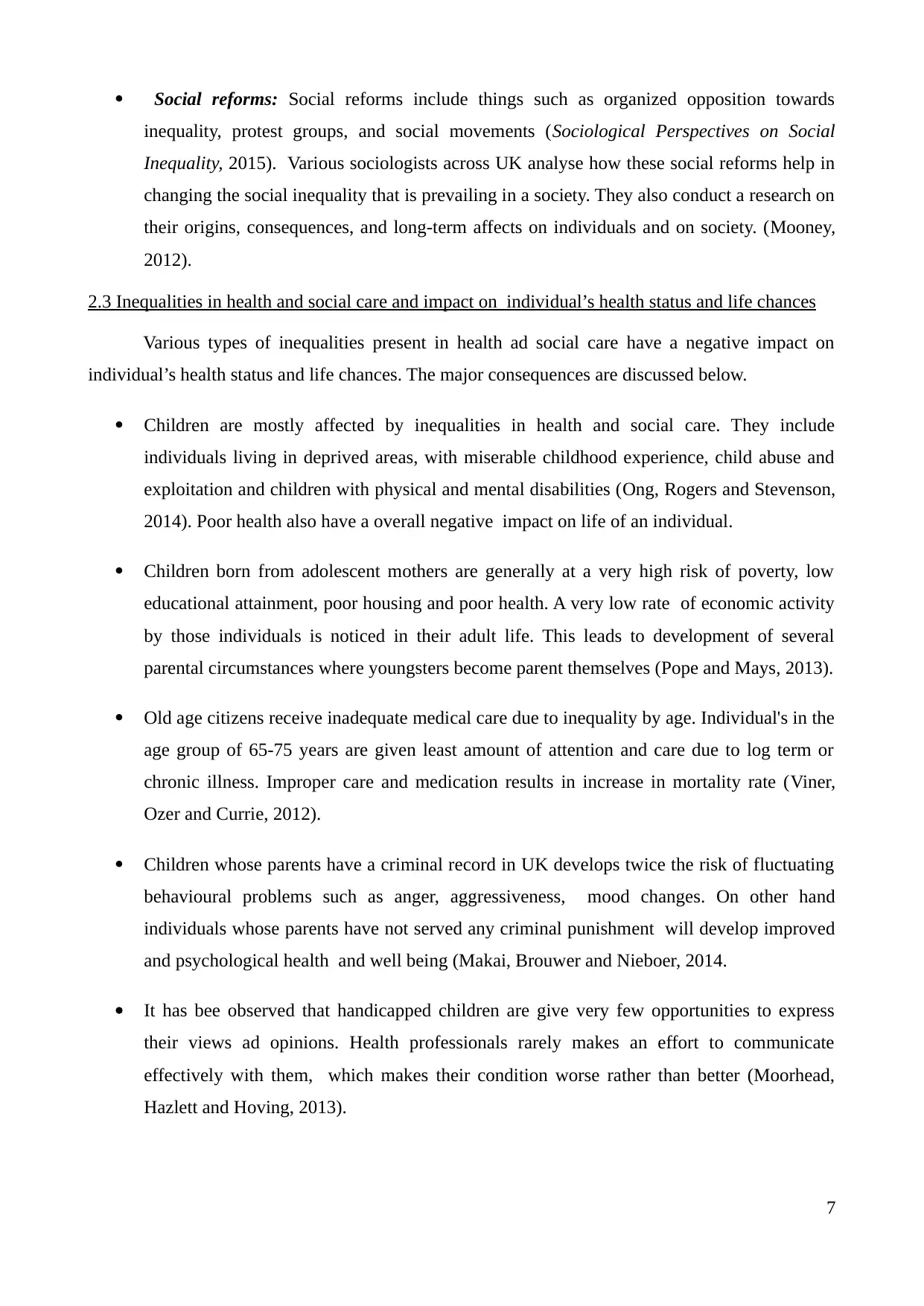
Social reforms: Social reforms include things such as organized opposition towards
inequality, protest groups, and social movements (Sociological Perspectives on Social
Inequality, 2015). Various sociologists across UK analyse how these social reforms help in
changing the social inequality that is prevailing in a society. They also conduct a research on
their origins, consequences, and long-term affects on individuals and on society. (Mooney,
2012).
2.3 Inequalities in health and social care and impact on individual’s health status and life chances
Various types of inequalities present in health ad social care have a negative impact on
individual’s health status and life chances. The major consequences are discussed below.
Children are mostly affected by inequalities in health and social care. They include
individuals living in deprived areas, with miserable childhood experience, child abuse and
exploitation and children with physical and mental disabilities (Ong, Rogers and Stevenson,
2014). Poor health also have a overall negative impact on life of an individual.
Children born from adolescent mothers are generally at a very high risk of poverty, low
educational attainment, poor housing and poor health. A very low rate of economic activity
by those individuals is noticed in their adult life. This leads to development of several
parental circumstances where youngsters become parent themselves (Pope and Mays, 2013).
Old age citizens receive inadequate medical care due to inequality by age. Individual's in the
age group of 65-75 years are given least amount of attention and care due to log term or
chronic illness. Improper care and medication results in increase in mortality rate (Viner,
Ozer and Currie, 2012).
Children whose parents have a criminal record in UK develops twice the risk of fluctuating
behavioural problems such as anger, aggressiveness, mood changes. On other hand
individuals whose parents have not served any criminal punishment will develop improved
and psychological health and well being (Makai, Brouwer and Nieboer, 2014.
It has bee observed that handicapped children are give very few opportunities to express
their views ad opinions. Health professionals rarely makes an effort to communicate
effectively with them, which makes their condition worse rather than better (Moorhead,
Hazlett and Hoving, 2013).
7
inequality, protest groups, and social movements (Sociological Perspectives on Social
Inequality, 2015). Various sociologists across UK analyse how these social reforms help in
changing the social inequality that is prevailing in a society. They also conduct a research on
their origins, consequences, and long-term affects on individuals and on society. (Mooney,
2012).
2.3 Inequalities in health and social care and impact on individual’s health status and life chances
Various types of inequalities present in health ad social care have a negative impact on
individual’s health status and life chances. The major consequences are discussed below.
Children are mostly affected by inequalities in health and social care. They include
individuals living in deprived areas, with miserable childhood experience, child abuse and
exploitation and children with physical and mental disabilities (Ong, Rogers and Stevenson,
2014). Poor health also have a overall negative impact on life of an individual.
Children born from adolescent mothers are generally at a very high risk of poverty, low
educational attainment, poor housing and poor health. A very low rate of economic activity
by those individuals is noticed in their adult life. This leads to development of several
parental circumstances where youngsters become parent themselves (Pope and Mays, 2013).
Old age citizens receive inadequate medical care due to inequality by age. Individual's in the
age group of 65-75 years are given least amount of attention and care due to log term or
chronic illness. Improper care and medication results in increase in mortality rate (Viner,
Ozer and Currie, 2012).
Children whose parents have a criminal record in UK develops twice the risk of fluctuating
behavioural problems such as anger, aggressiveness, mood changes. On other hand
individuals whose parents have not served any criminal punishment will develop improved
and psychological health and well being (Makai, Brouwer and Nieboer, 2014.
It has bee observed that handicapped children are give very few opportunities to express
their views ad opinions. Health professionals rarely makes an effort to communicate
effectively with them, which makes their condition worse rather than better (Moorhead,
Hazlett and Hoving, 2013).
7
Paraphrase This Document
Need a fresh take? Get an instant paraphrase of this document with our AI Paraphraser
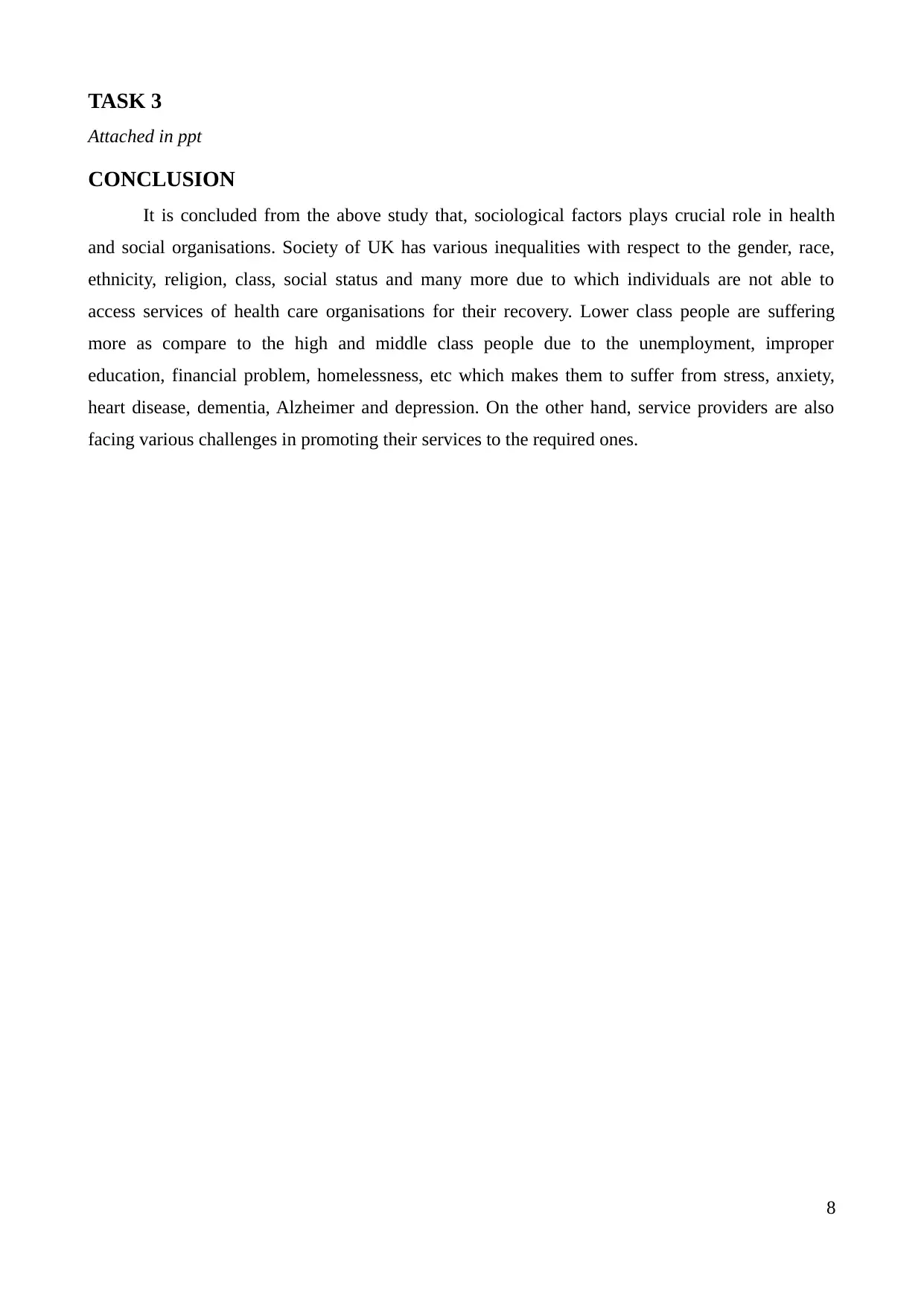
TASK 3
Attached in ppt
CONCLUSION
It is concluded from the above study that, sociological factors plays crucial role in health
and social organisations. Society of UK has various inequalities with respect to the gender, race,
ethnicity, religion, class, social status and many more due to which individuals are not able to
access services of health care organisations for their recovery. Lower class people are suffering
more as compare to the high and middle class people due to the unemployment, improper
education, financial problem, homelessness, etc which makes them to suffer from stress, anxiety,
heart disease, dementia, Alzheimer and depression. On the other hand, service providers are also
facing various challenges in promoting their services to the required ones.
8
Attached in ppt
CONCLUSION
It is concluded from the above study that, sociological factors plays crucial role in health
and social organisations. Society of UK has various inequalities with respect to the gender, race,
ethnicity, religion, class, social status and many more due to which individuals are not able to
access services of health care organisations for their recovery. Lower class people are suffering
more as compare to the high and middle class people due to the unemployment, improper
education, financial problem, homelessness, etc which makes them to suffer from stress, anxiety,
heart disease, dementia, Alzheimer and depression. On the other hand, service providers are also
facing various challenges in promoting their services to the required ones.
8
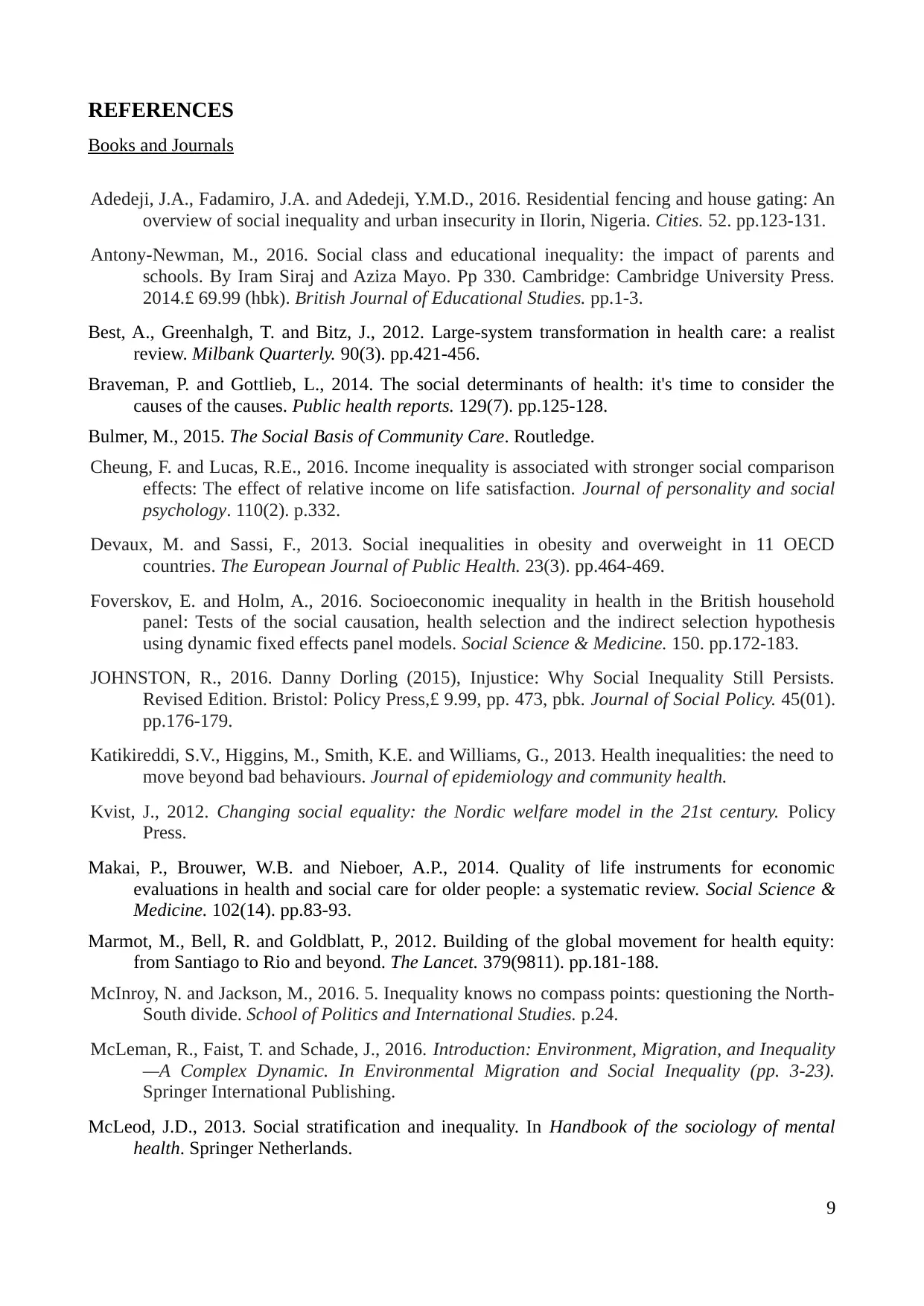
REFERENCES
Books and Journals
Adedeji, J.A., Fadamiro, J.A. and Adedeji, Y.M.D., 2016. Residential fencing and house gating: An
overview of social inequality and urban insecurity in Ilorin, Nigeria. Cities. 52. pp.123-131.
Antony-Newman, M., 2016. Social class and educational inequality: the impact of parents and
schools. By Iram Siraj and Aziza Mayo. Pp 330. Cambridge: Cambridge University Press.
2014.£ 69.99 (hbk). British Journal of Educational Studies. pp.1-3.
Best, A., Greenhalgh, T. and Bitz, J., 2012. Large‐system transformation in health care: a realist
review. Milbank Quarterly. 90(3). pp.421-456.
Braveman, P. and Gottlieb, L., 2014. The social determinants of health: it's time to consider the
causes of the causes. Public health reports. 129(7). pp.125-128.
Bulmer, M., 2015. The Social Basis of Community Care. Routledge.
Cheung, F. and Lucas, R.E., 2016. Income inequality is associated with stronger social comparison
effects: The effect of relative income on life satisfaction. Journal of personality and social
psychology. 110(2). p.332.
Devaux, M. and Sassi, F., 2013. Social inequalities in obesity and overweight in 11 OECD
countries. The European Journal of Public Health. 23(3). pp.464-469.
Foverskov, E. and Holm, A., 2016. Socioeconomic inequality in health in the British household
panel: Tests of the social causation, health selection and the indirect selection hypothesis
using dynamic fixed effects panel models. Social Science & Medicine. 150. pp.172-183.
JOHNSTON, R., 2016. Danny Dorling (2015), Injustice: Why Social Inequality Still Persists.
Revised Edition. Bristol: Policy Press,£ 9.99, pp. 473, pbk. Journal of Social Policy. 45(01).
pp.176-179.
Katikireddi, S.V., Higgins, M., Smith, K.E. and Williams, G., 2013. Health inequalities: the need to
move beyond bad behaviours. Journal of epidemiology and community health.
Kvist, J., 2012. Changing social equality: the Nordic welfare model in the 21st century. Policy
Press.
Makai, P., Brouwer, W.B. and Nieboer, A.P., 2014. Quality of life instruments for economic
evaluations in health and social care for older people: a systematic review. Social Science &
Medicine. 102(14). pp.83-93.
Marmot, M., Bell, R. and Goldblatt, P., 2012. Building of the global movement for health equity:
from Santiago to Rio and beyond. The Lancet. 379(9811). pp.181-188.
McInroy, N. and Jackson, M., 2016. 5. Inequality knows no compass points: questioning the North-
South divide. School of Politics and International Studies. p.24.
McLeman, R., Faist, T. and Schade, J., 2016. Introduction: Environment, Migration, and Inequality
—A Complex Dynamic. In Environmental Migration and Social Inequality (pp. 3-23).
Springer International Publishing.
McLeod, J.D., 2013. Social stratification and inequality. In Handbook of the sociology of mental
health. Springer Netherlands.
9
Books and Journals
Adedeji, J.A., Fadamiro, J.A. and Adedeji, Y.M.D., 2016. Residential fencing and house gating: An
overview of social inequality and urban insecurity in Ilorin, Nigeria. Cities. 52. pp.123-131.
Antony-Newman, M., 2016. Social class and educational inequality: the impact of parents and
schools. By Iram Siraj and Aziza Mayo. Pp 330. Cambridge: Cambridge University Press.
2014.£ 69.99 (hbk). British Journal of Educational Studies. pp.1-3.
Best, A., Greenhalgh, T. and Bitz, J., 2012. Large‐system transformation in health care: a realist
review. Milbank Quarterly. 90(3). pp.421-456.
Braveman, P. and Gottlieb, L., 2014. The social determinants of health: it's time to consider the
causes of the causes. Public health reports. 129(7). pp.125-128.
Bulmer, M., 2015. The Social Basis of Community Care. Routledge.
Cheung, F. and Lucas, R.E., 2016. Income inequality is associated with stronger social comparison
effects: The effect of relative income on life satisfaction. Journal of personality and social
psychology. 110(2). p.332.
Devaux, M. and Sassi, F., 2013. Social inequalities in obesity and overweight in 11 OECD
countries. The European Journal of Public Health. 23(3). pp.464-469.
Foverskov, E. and Holm, A., 2016. Socioeconomic inequality in health in the British household
panel: Tests of the social causation, health selection and the indirect selection hypothesis
using dynamic fixed effects panel models. Social Science & Medicine. 150. pp.172-183.
JOHNSTON, R., 2016. Danny Dorling (2015), Injustice: Why Social Inequality Still Persists.
Revised Edition. Bristol: Policy Press,£ 9.99, pp. 473, pbk. Journal of Social Policy. 45(01).
pp.176-179.
Katikireddi, S.V., Higgins, M., Smith, K.E. and Williams, G., 2013. Health inequalities: the need to
move beyond bad behaviours. Journal of epidemiology and community health.
Kvist, J., 2012. Changing social equality: the Nordic welfare model in the 21st century. Policy
Press.
Makai, P., Brouwer, W.B. and Nieboer, A.P., 2014. Quality of life instruments for economic
evaluations in health and social care for older people: a systematic review. Social Science &
Medicine. 102(14). pp.83-93.
Marmot, M., Bell, R. and Goldblatt, P., 2012. Building of the global movement for health equity:
from Santiago to Rio and beyond. The Lancet. 379(9811). pp.181-188.
McInroy, N. and Jackson, M., 2016. 5. Inequality knows no compass points: questioning the North-
South divide. School of Politics and International Studies. p.24.
McLeman, R., Faist, T. and Schade, J., 2016. Introduction: Environment, Migration, and Inequality
—A Complex Dynamic. In Environmental Migration and Social Inequality (pp. 3-23).
Springer International Publishing.
McLeod, J.D., 2013. Social stratification and inequality. In Handbook of the sociology of mental
health. Springer Netherlands.
9
⊘ This is a preview!⊘
Do you want full access?
Subscribe today to unlock all pages.

Trusted by 1+ million students worldwide
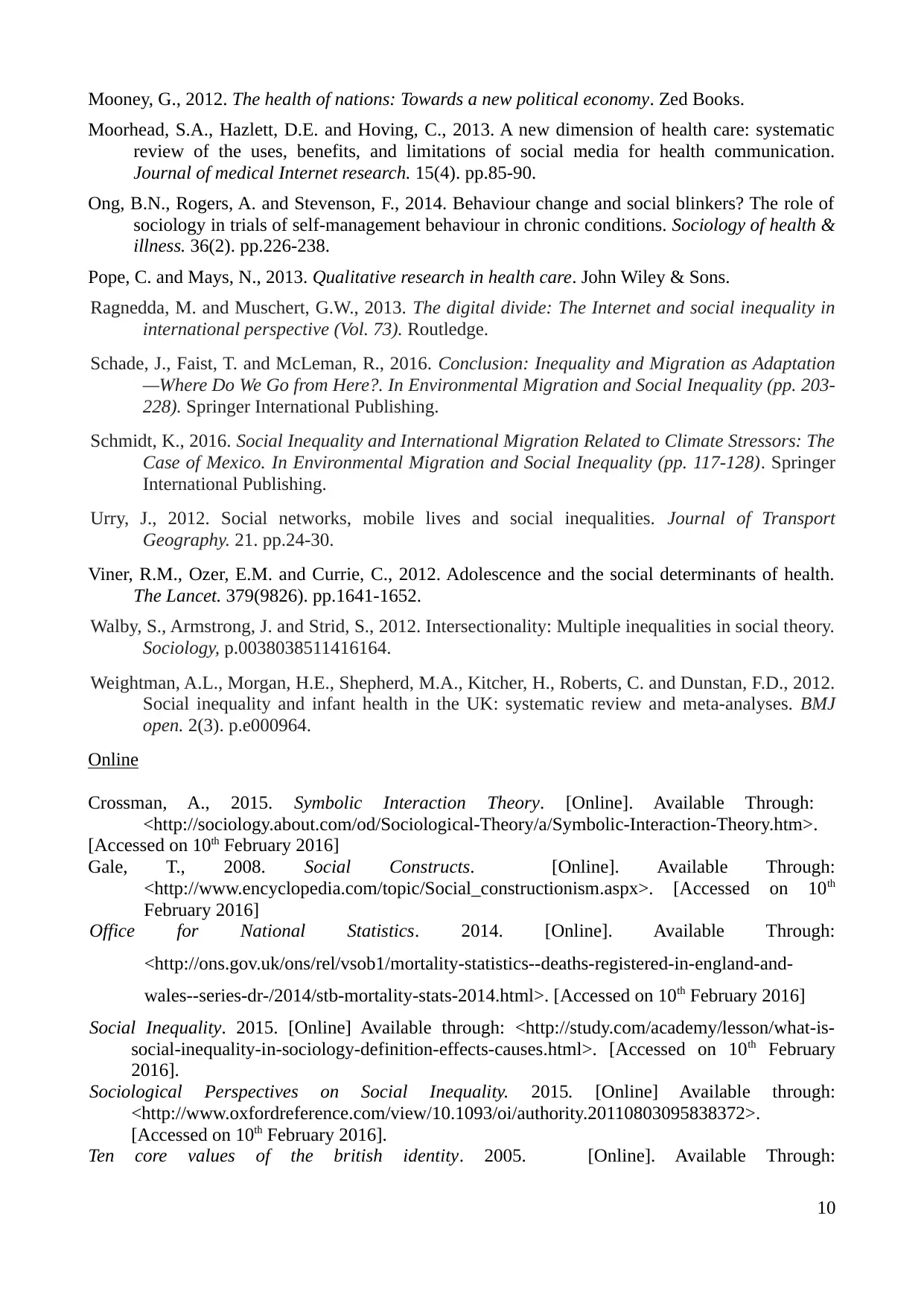
Mooney, G., 2012. The health of nations: Towards a new political economy. Zed Books.
Moorhead, S.A., Hazlett, D.E. and Hoving, C., 2013. A new dimension of health care: systematic
review of the uses, benefits, and limitations of social media for health communication.
Journal of medical Internet research. 15(4). pp.85-90.
Ong, B.N., Rogers, A. and Stevenson, F., 2014. Behaviour change and social blinkers? The role of
sociology in trials of self‐management behaviour in chronic conditions. Sociology of health &
illness. 36(2). pp.226-238.
Pope, C. and Mays, N., 2013. Qualitative research in health care. John Wiley & Sons.
Ragnedda, M. and Muschert, G.W., 2013. The digital divide: The Internet and social inequality in
international perspective (Vol. 73). Routledge.
Schade, J., Faist, T. and McLeman, R., 2016. Conclusion: Inequality and Migration as Adaptation
—Where Do We Go from Here?. In Environmental Migration and Social Inequality (pp. 203-
228). Springer International Publishing.
Schmidt, K., 2016. Social Inequality and International Migration Related to Climate Stressors: The
Case of Mexico. In Environmental Migration and Social Inequality (pp. 117-128). Springer
International Publishing.
Urry, J., 2012. Social networks, mobile lives and social inequalities. Journal of Transport
Geography. 21. pp.24-30.
Viner, R.M., Ozer, E.M. and Currie, C., 2012. Adolescence and the social determinants of health.
The Lancet. 379(9826). pp.1641-1652.
Walby, S., Armstrong, J. and Strid, S., 2012. Intersectionality: Multiple inequalities in social theory.
Sociology, p.0038038511416164.
Weightman, A.L., Morgan, H.E., Shepherd, M.A., Kitcher, H., Roberts, C. and Dunstan, F.D., 2012.
Social inequality and infant health in the UK: systematic review and meta-analyses. BMJ
open. 2(3). p.e000964.
Online
Crossman, A., 2015. Symbolic Interaction Theory. [Online]. Available Through:
<http://sociology.about.com/od/Sociological-Theory/a/Symbolic-Interaction-Theory.htm>.
[Accessed on 10th February 2016]
Gale, T., 2008. Social Constructs. [Online]. Available Through:
<http://www.encyclopedia.com/topic/Social_constructionism.aspx>. [Accessed on 10th
February 2016]
Office for National Statistics. 2014. [Online]. Available Through:
<http://ons.gov.uk/ons/rel/vsob1/mortality-statistics--deaths-registered-in-england-and-
wales--series-dr-/2014/stb-mortality-stats-2014.html>. [Accessed on 10th February 2016]
Social Inequality. 2015. [Online] Available through: <http://study.com/academy/lesson/what-is-
social-inequality-in-sociology-definition-effects-causes.html>. [Accessed on 10th February
2016].
Sociological Perspectives on Social Inequality. 2015. [Online] Available through:
<http://www.oxfordreference.com/view/10.1093/oi/authority.20110803095838372>.
[Accessed on 10th February 2016].
Ten core values of the british identity. 2005. [Online]. Available Through:
10
Moorhead, S.A., Hazlett, D.E. and Hoving, C., 2013. A new dimension of health care: systematic
review of the uses, benefits, and limitations of social media for health communication.
Journal of medical Internet research. 15(4). pp.85-90.
Ong, B.N., Rogers, A. and Stevenson, F., 2014. Behaviour change and social blinkers? The role of
sociology in trials of self‐management behaviour in chronic conditions. Sociology of health &
illness. 36(2). pp.226-238.
Pope, C. and Mays, N., 2013. Qualitative research in health care. John Wiley & Sons.
Ragnedda, M. and Muschert, G.W., 2013. The digital divide: The Internet and social inequality in
international perspective (Vol. 73). Routledge.
Schade, J., Faist, T. and McLeman, R., 2016. Conclusion: Inequality and Migration as Adaptation
—Where Do We Go from Here?. In Environmental Migration and Social Inequality (pp. 203-
228). Springer International Publishing.
Schmidt, K., 2016. Social Inequality and International Migration Related to Climate Stressors: The
Case of Mexico. In Environmental Migration and Social Inequality (pp. 117-128). Springer
International Publishing.
Urry, J., 2012. Social networks, mobile lives and social inequalities. Journal of Transport
Geography. 21. pp.24-30.
Viner, R.M., Ozer, E.M. and Currie, C., 2012. Adolescence and the social determinants of health.
The Lancet. 379(9826). pp.1641-1652.
Walby, S., Armstrong, J. and Strid, S., 2012. Intersectionality: Multiple inequalities in social theory.
Sociology, p.0038038511416164.
Weightman, A.L., Morgan, H.E., Shepherd, M.A., Kitcher, H., Roberts, C. and Dunstan, F.D., 2012.
Social inequality and infant health in the UK: systematic review and meta-analyses. BMJ
open. 2(3). p.e000964.
Online
Crossman, A., 2015. Symbolic Interaction Theory. [Online]. Available Through:
<http://sociology.about.com/od/Sociological-Theory/a/Symbolic-Interaction-Theory.htm>.
[Accessed on 10th February 2016]
Gale, T., 2008. Social Constructs. [Online]. Available Through:
<http://www.encyclopedia.com/topic/Social_constructionism.aspx>. [Accessed on 10th
February 2016]
Office for National Statistics. 2014. [Online]. Available Through:
<http://ons.gov.uk/ons/rel/vsob1/mortality-statistics--deaths-registered-in-england-and-
wales--series-dr-/2014/stb-mortality-stats-2014.html>. [Accessed on 10th February 2016]
Social Inequality. 2015. [Online] Available through: <http://study.com/academy/lesson/what-is-
social-inequality-in-sociology-definition-effects-causes.html>. [Accessed on 10th February
2016].
Sociological Perspectives on Social Inequality. 2015. [Online] Available through:
<http://www.oxfordreference.com/view/10.1093/oi/authority.20110803095838372>.
[Accessed on 10th February 2016].
Ten core values of the british identity. 2005. [Online]. Available Through:
10
Paraphrase This Document
Need a fresh take? Get an instant paraphrase of this document with our AI Paraphraser
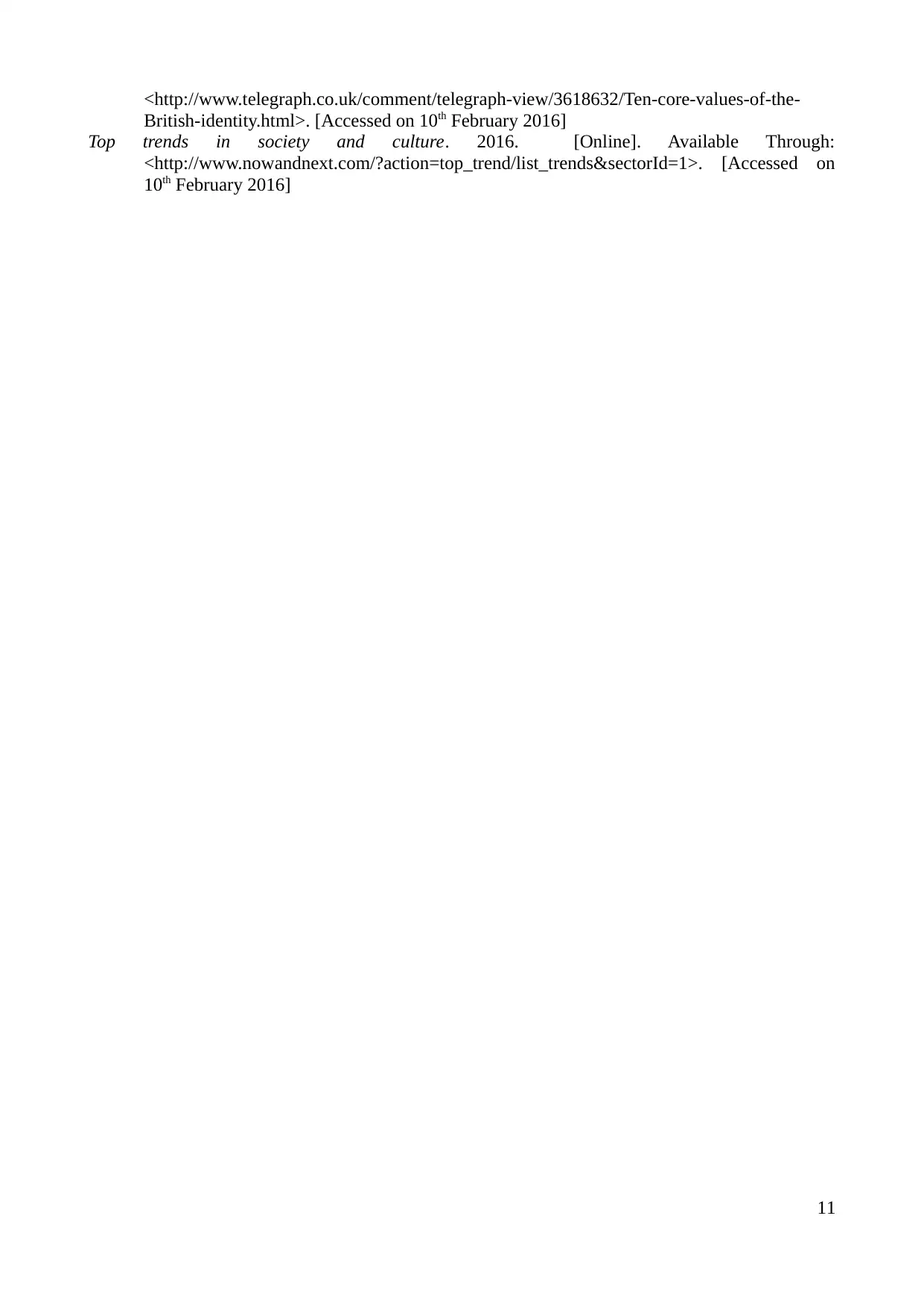
<http://www.telegraph.co.uk/comment/telegraph-view/3618632/Ten-core-values-of-the-
British-identity.html>. [Accessed on 10th February 2016]
Top trends in society and culture. 2016. [Online]. Available Through:
<http://www.nowandnext.com/?action=top_trend/list_trends§orId=1>. [Accessed on
10th February 2016]
11
British-identity.html>. [Accessed on 10th February 2016]
Top trends in society and culture. 2016. [Online]. Available Through:
<http://www.nowandnext.com/?action=top_trend/list_trends§orId=1>. [Accessed on
10th February 2016]
11
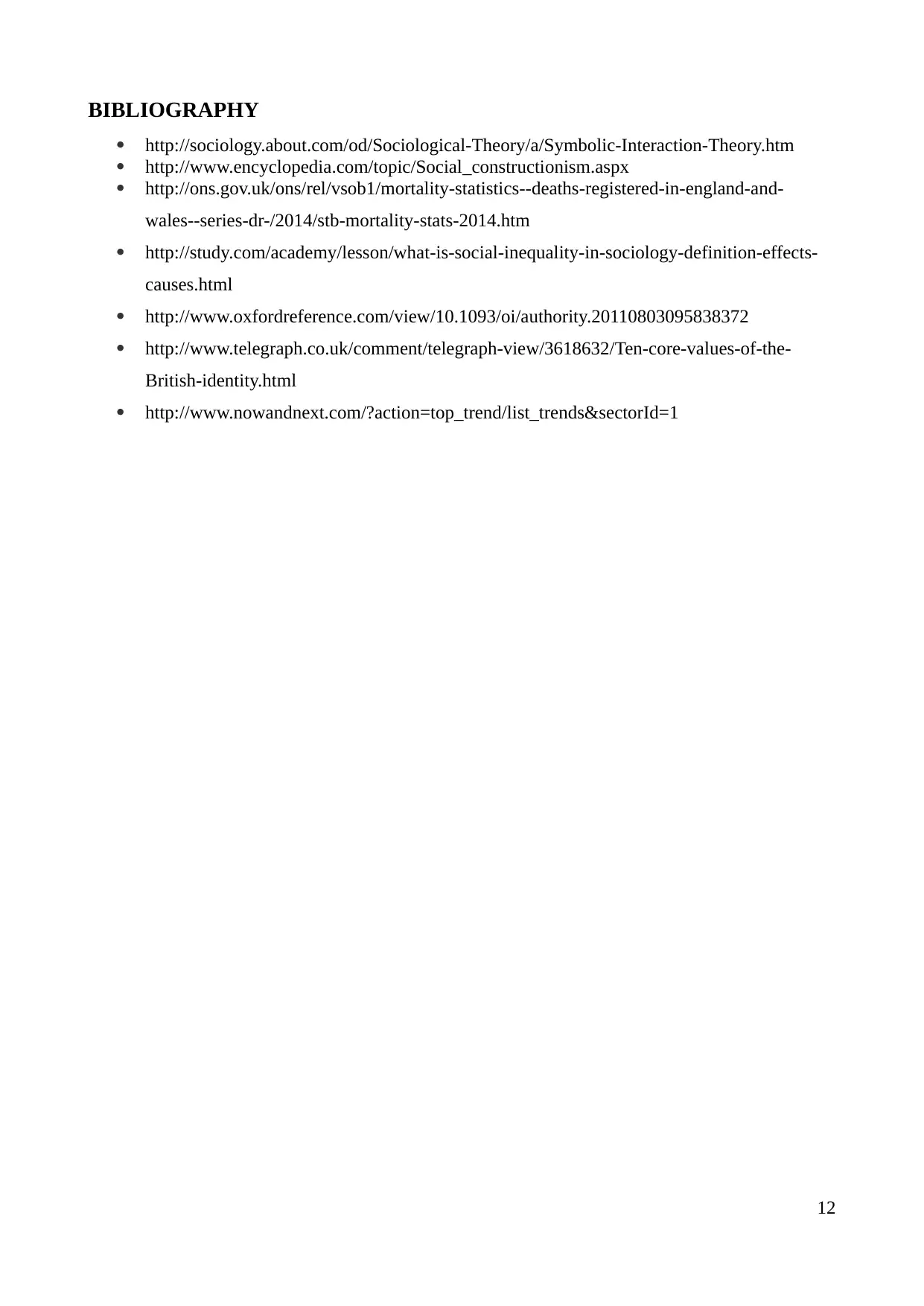
BIBLIOGRAPHY
http://sociology.about.com/od/Sociological-Theory/a/Symbolic-Interaction-Theory.htm
http://www.encyclopedia.com/topic/Social_constructionism.aspx
http://ons.gov.uk/ons/rel/vsob1/mortality-statistics--deaths-registered-in-england-and-
wales--series-dr-/2014/stb-mortality-stats-2014.htm
http://study.com/academy/lesson/what-is-social-inequality-in-sociology-definition-effects-
causes.html
http://www.oxfordreference.com/view/10.1093/oi/authority.20110803095838372
http://www.telegraph.co.uk/comment/telegraph-view/3618632/Ten-core-values-of-the-
British-identity.html
http://www.nowandnext.com/?action=top_trend/list_trends§orId=1
12
http://sociology.about.com/od/Sociological-Theory/a/Symbolic-Interaction-Theory.htm
http://www.encyclopedia.com/topic/Social_constructionism.aspx
http://ons.gov.uk/ons/rel/vsob1/mortality-statistics--deaths-registered-in-england-and-
wales--series-dr-/2014/stb-mortality-stats-2014.htm
http://study.com/academy/lesson/what-is-social-inequality-in-sociology-definition-effects-
causes.html
http://www.oxfordreference.com/view/10.1093/oi/authority.20110803095838372
http://www.telegraph.co.uk/comment/telegraph-view/3618632/Ten-core-values-of-the-
British-identity.html
http://www.nowandnext.com/?action=top_trend/list_trends§orId=1
12
⊘ This is a preview!⊘
Do you want full access?
Subscribe today to unlock all pages.

Trusted by 1+ million students worldwide
1 out of 12
Related Documents
Your All-in-One AI-Powered Toolkit for Academic Success.
+13062052269
info@desklib.com
Available 24*7 on WhatsApp / Email
![[object Object]](/_next/static/media/star-bottom.7253800d.svg)
Unlock your academic potential
Copyright © 2020–2025 A2Z Services. All Rights Reserved. Developed and managed by ZUCOL.





